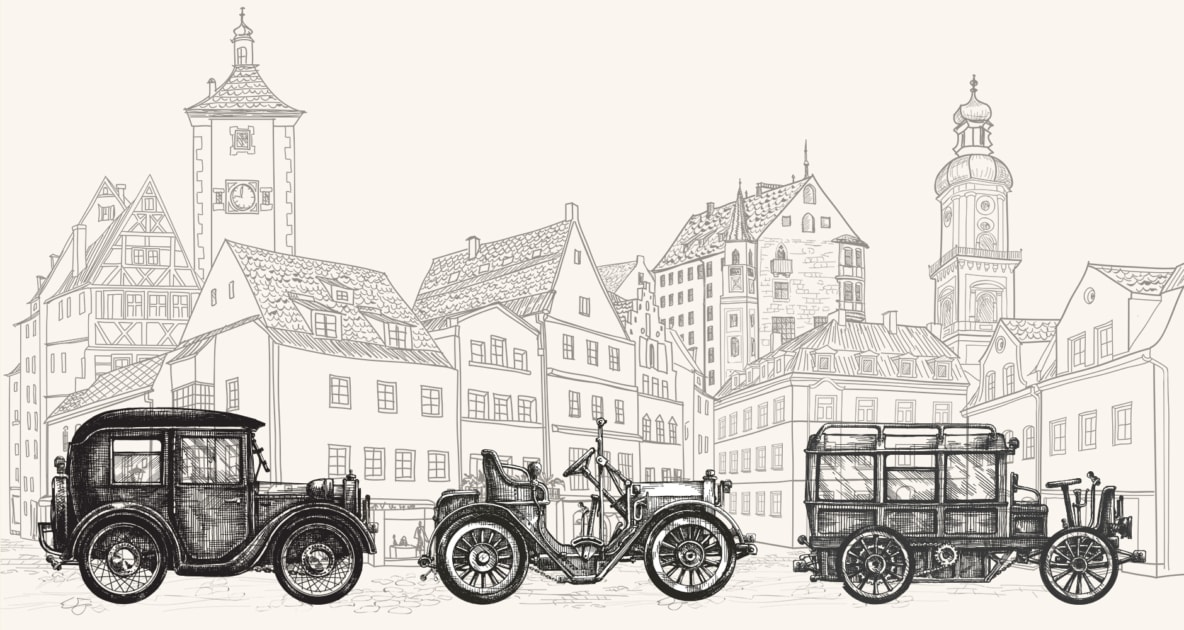10 Tips For Caring For Your Motorcar, According to the 1900 Farmers’ Almanac
Read our advice on how to care for the new "motorcar" in this Flashback from our 1900 edition. And you thought a routine oil change was hard to remember!

Read the advice the Farmers’ Almanac gave in 1900 on caring for this new item called the “automobile.”
Automobile Overview, from the 1900 Farmers’ Almanac
- The first automobile store was started in Detroit in 1895. In July 1898, the news was out that a plant would be built to turn out one motorcar a week!
- Among the various automobile meters is one which shows how many miles is being traveled to each gallon of fuel.
- Safety is the leading feature of a new motor omnibus, which cannot be started while the entrance door is open, while the door cannot be opened while the vehicle is in motion.
- Hot water has a marked deteriorating effect on the varnished surface of any automobile body. Tepid water is ideal, although cool water may also be used without harm. After the car has been properly washed and wiped dry with a chamois, it is time well spent to go over it thoroughly with a high-grade automobile or piano polish. Use a good grade of cheesecloth and wipe dry, as wet polish will collect dust.
- All parts of the brake system should be inspected and tested every two weeks. When the brakes are not adjusted equally, there is not only danger of skidding, but premature tire wear will result. When the brake on one side locks the wheel, while the other is still revolving, the casing on the locked side is scraped along the ground, much to the detriment of the tread.
- Watch your steering mechanism closely. Do not allow too much-lost motion in the wheel. A careful inspection should be made from the wheels back to determine that all parts of the steering linkage are tight and properly adjusted. Proper lubrication will ensure not only easier control of the car but great safety as well.
- When the motor gets hot and the water boils, lack of precaution may mean much damage to the motor and loss of time to the operator. It is well to keep in mind that the cause of the trouble is often trivial and the remedy simple. A loose fan belt and overloading are the commonest causes of overheating.
- It is not unusual for a piston ring to break. This occurrence usually manifests itself with a light tapping in the engine and usually by the failure of the cylinder to hold compression as well as usual when the engine is cranked over by hand. Lack of cylinder oil may cause it. A broken ring should be replaced at once, as it is apt to score the cylinder.
- The carrying of extra spark plugs often proves expensive. A very good way to protect them is to take an old garden hose and insert plugs. In this way, they can be carried in the toolbox without fear of becoming injured.
- A few years back, hard-surfaced highways were opposed by farmers. In fact, a man was defeated for the governorship of a western state in a good roads campaign. Now that most farmers have an automobile, and that trucks relieve railroad transportation, there has come a complete change of mind in regard to hard-roads.
This article was published by the staff at Farmers' Almanac. Do you have a question or an idea for an article? Contact us!







#7- And it would be another 26 years before anti-freeze would be commercially available for cars. If you lived in a cold environment where water freezes easily, your new motorcar would be virtually useless for almost half a year.
How crazy and how far we’ve come! Thanks for your comment!